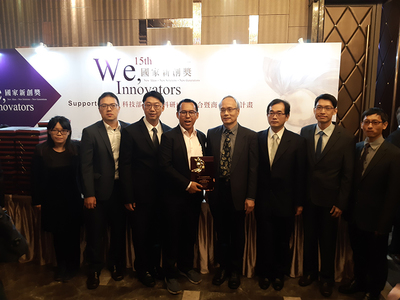


A National Cheng Kung University (NCKU) project on the application of a portable smart bladder irrigation device won the country’s 15th National Innovation Awards on Nov. 30 for its innovation, application value and market potential, the Tainan-based academy said.
The assistive device, which bagged the award in the Clinical Application Innovation category, can help patients in nursing homes to reduce and prevent the urinary tract infection (UTI), said Dr. Chen-Hsun Wong, Industry-Academic Collaboration Chief at NCKU Medical Device Innovation Center.
Dr. Ming-Chien Hung; Dr. Sheng-Yang Huang, Ph. D. student Chia-Jung Chang of NCKU Department of Biomedical Engineering; NCKU Hospital urologists Wen-Horng Yang and Jiann-Hui Ou; as well as Bi-Fong Fong, Vice President of Global Research & Industry Alliance (GLORIA) all made contribution to the award-winning device.
UTI typically occurs when bacteria enter the urinary tract through the urethra and begin to multiply in the bladder. It is very common, accounting for 30-40 percent of the nosocomial infections. Ninety percent of the UTI is induced by long-term indwelling bladder catheter, especially for patients suffering from spine injury, diabetes, Parkinson's disease, stroke, brain tumor, or those in need of long-term care, and even pregnant women. For a severe UTI, it can lead to sepsis, a leading cause of death.
One of the key components of the self-developed smart bladder irrigation device is the use of active carbon, which has bigger specific surface area to inhibit bacterial growth as well as better endotoxin, exotoxin adsorption to reduce pathogenicity.
The portable device, the team said, serves the best purpose for the elderly that cannot stand high dose of antibiotics and their side effects. The winning gadget can delay the course of disease and buy doctors time for urinalyses, as it boasts sensing chips and irrigations that can fast filter bacteria and lower their number to the minimum level and reduce infections, according to the R&D team.